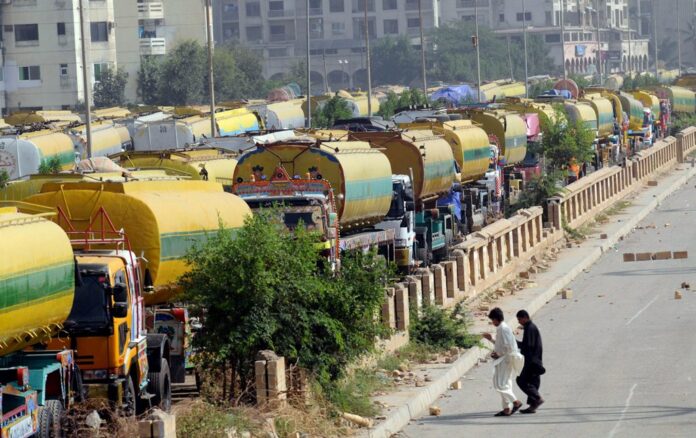LAHORE: Taking advantage of overreliance on oil tankers for fuel supplies, the All Pakistan Oil Tankers Owners Association (APOTOA) has once again pressurized the government to withdraw orders aimed at reducing traffic jams and improving road safety.
On December 16, the tankers’ association had announced a strike to protest the Rawalpindi district administration’s decision to bar the entry of oil tankers in city areas during the daytime hours.
As per the new rules, the movement of oil tankers was to be restricted only between 10pm to 6am, as a survey of the city and cantonment areas had showed that morning and evening rush was mainly due to the presence of heavy vehicles.
With the announcement of strike, oil supplies to Rawalpindi, Islamabad, Azad Kashmir, Gilgit-Baltistan, Islamabad Airport and power plants were stopped. A severe fuel crisis was feared in these areas as only up to two days of stock was available at petrol stations. In addition, the protesting drivers had also gathered outside government buildings, besides blocking roads across the twin cities.
However, after several rounds of discussions between the district administration and APOTOA, the authorities buckled under pressure and allowed the tankers to operate from 7pm to 7am in the city areas and after 10pm till the morning in cantonment limits.
The association also agreed to the demand of ensuring the tankers’ safety and assured of following the standard operating procedures issued by the Oil and Gas Regulatory Authority (OGRA).
Estimates by OGRA suggest that 85pc of oil tankers are non-compliant with the prescribed safety standards. These safety violations have resulted in major accidents, like the Ahmedpur East tanker explosion in 2017, which led to tragic loss of more than 200 lives. Currently, it is estimated that around 12,000 oil tankers are engaged in the transportation of more than 60pc of petroleum products across Pakistan. These tankers cause road congestion, accidents, pilferage, late deliveries and immense damage to the highway network due to being overloaded.



































